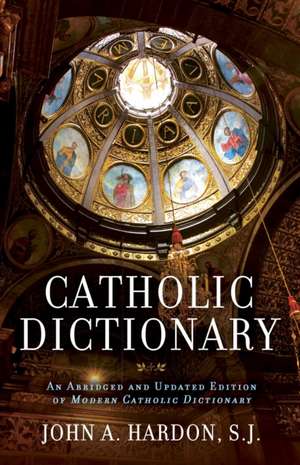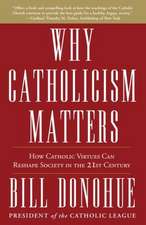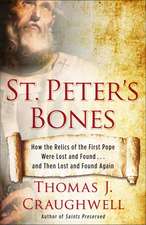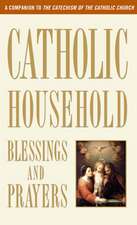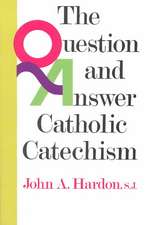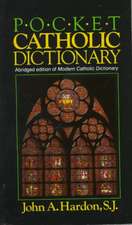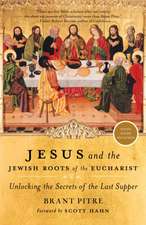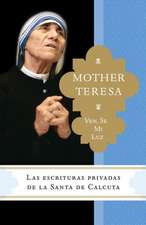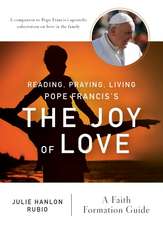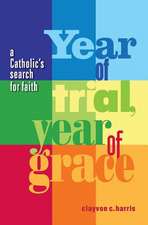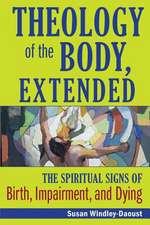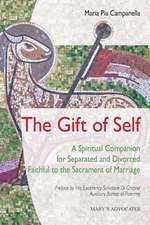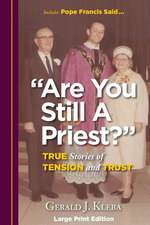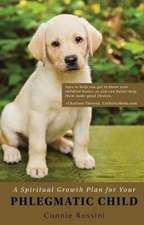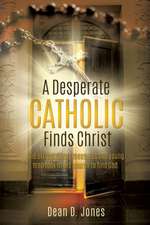Catholic Dictionary
Autor John A. Hardonen Limba Engleză Paperback – 24 iun 2013
terms of Catholicism; updated to include the most recent developments in the
Catholic Church.
Clear, concise, and faithful, with over 2,000 entries, Catholic Dictionary is the essential Catholic lexicon in the areas of faith, worship, morals, history, theology, and spirituality. Now revised to include the statements of Pope Benedict XVI and Pope John Paul II, new movements and devotions, and other recent developments within Catholicism, this edition brings the legacy of Father Hardon into the contemporary era. A worthy companion to Catechism of the Catholic Church and Scott Hahn's Catholic Bible Dictionary, this book is an essential resource for the Catholic reader.
Preț: 124.36 lei
Nou
Puncte Express: 187
Preț estimativ în valută:
23.80€ • 24.80$ • 19.70£
23.80€ • 24.80$ • 19.70£
Carte disponibilă
Livrare economică 14-28 martie
Preluare comenzi: 021 569.72.76
Specificații
ISBN-13: 9780307886347
ISBN-10: 0307886344
Pagini: 556
Dimensiuni: 133 x 203 x 30 mm
Greutate: 0.44 kg
Ediția:Prescurtată
Editura: IMAGE
ISBN-10: 0307886344
Pagini: 556
Dimensiuni: 133 x 203 x 30 mm
Greutate: 0.44 kg
Ediția:Prescurtată
Editura: IMAGE
Notă biografică
John A. Hardon, S.J. was a member of the Society of Jesus for over fifty years. He died in December, 2000. Father Hardon held a Master's Degree in Philosophy from Loyola University and A Doctorate in Theology from the Gregorian University in Rome. He taught at the Jesuit School of Theology at Loyola University in Chicago and the Institute for Advanced Studies in Catholic Doctrine at St. John's University in New York as well as helped organize and publish the Christ Our Life series of religion books for elementary schools and Confraternity of Christian Doctrine programs. Father Hardon was the author of many books, including: The Catholic Catechism, Religions of the World, Protestant Churches of America, Christianity in the Twentieth Century, and Spiritual Life in the Modern World.
Extras
A
AARON. The founder and first head of the Hebrew priesthood for almost forty years. Son of Amram and Jochebed, he was the brother of Moses and Miriam (Exodus 6:20). He married Elisheba, and one of his sons, Eleazar, succeeded him in heading the priesthood. Aaron was associated with Moses in every enterprise (Exodus 6:23) and acted as his brother’s spokesman because of his eloquence (Exodus 4:16). In the early Pentateuch narratives, his role was mentioned in connection with the Exodus, the making of the golden calf, and taunting Moses for marrying his Ethiopian wife. Apparently he was punished for doubting God’s ability to cause water to spring from the rock at Meribah. After a long life he died and was buried at Mount Hor (Numbers 20:27ߝ29).
ABBA. “Father,” transliterated from the Aramaic. St. Paul says, “It is the spirit of sons, and it makes us cry out ‘Abba, Father’ ” (Romans 8:15).
ABBESS. Feminine counterpart of abbot. The spiritual and temporal superior of a community of nuns, symbolizing her role as mother of the religious women under her care. Over the centuries an abbess has enjoyed some extraordinary privileges, such as wearing a special ring and bearing the crosier as a sign of her rank. But an abbess does not have ecclesiastical jurisdiction corresponding to that of an abbot. See also ABBOT.
ABBEY. Canonically erected and independent monastery with a required minimum of religious. Occupied by monks, it is ruled by an abbot; if by nuns, ruled by an abbess. With the exception of Carthusian abbeys, which provide cottages for individual monks, most abbey buildings are constructed around a quadrangle and consist of a novitiate, guest house, choir, conference room, infirmary, kitchen, refectory, cells, dormitory, oratory for prayer, almonry for alms distribution, cellars for storage, calefactory (or warming room), locutory (or parlor), and a chapter house for business and private meetings with the superior. Most abbeys are either Benedictine or Cistercian.
ABBOT. Superior of a monastery of monks having a settled location; a title definitely fixed by St. Benedict. The abbot is elected, usually for life, by the professed members of the community in a secret ballot. The authority of an abbot is, first, paternal, administering the property of the abbey and maintaining discipline in the observance of rule, and, second, is quasi-episcopal in conferring a certain territorial jurisdiction. The rule of the order determines the qualifications of its abbot. His insignia are the pectoral cross and a ring. (Etym. Aramaic abba, father.) See also ABBESS.
ABEL. The second son of Adam and Eve, slain by his brother, Cain, who was jealous because Abel’s offering to God was more acceptable than Cain’s. Abel was a shepherd and his brother a farmer (Genesis 4:2, 4:8). During his ministry Jesus made references to Cain’s offense when he warned the Scribes and Pharisees, “. . . you will draw down on yourselves the blood of every holy man that has been shed on earth, from the blood of Abel the Holy to the blood of Zechariah . . .” (Matthew 23:35).
ABJURATION. In Church law, the formal renunciation of apostasy, heresy, or schism. While still in effect in exceptional cases, persons now entering the Catholic Church are not required to abjure their former doctrinal errors. Their positive profession of the Catholic faith implies their abjuration of whatever they may have once held contrary to this faith. (Etym. Latin abiuratio, a foreswearing, abjuration; from ab, from + iurare, to swear: abiurare, to swear away from, to deny on oath.)
ABLUTION. Liturgical washing with water. In the Latin Rite baptism is generally conferred by ablution—i.e., the pouring of water over the person’s head. Also the ritual washing of the thumbs and index fingers of the celebrant at Mass; the cleansing of the chalice used during Mass; and the washing of feet in the Holy Thursday ceremony. In the Greek Church ablution refers to the public washing of newly baptized persons. (Etym. Latin ablutio, a washing away or cleansing; a spiritual cleaning.)
ABORTION. In Catholic morality, abortion is either direct (induced) or indirect. Direct abortion is any destruction of the product of human conception, whether before or after implantation in the womb. A direct abortion is one that is intended either as an end in itself or as a means to an end. As a willful attack on unborn human life, no matter what the motive, direct abortion is always a grave objective evil.
Indirect abortion is the foreseen but merely permitted evacuation of a fetus that cannot survive outside the womb. The evacuation is not the intended or directly willed result, but the side effect, of some legitimate procedure. As such it is morally allowable.
The essential sinfulness of direct abortion consists in the homicidal intent to kill innocent life. This factor places the controverted question as to precisely when human life begins outside the ambit of the moral issue; as it also makes the now commonly held Catholic position that human life begins at conception equally outside the heart of the Church’s teaching about the grave sinfulness of direct abortion.
Abortion was condemned by the Church since apostolic times. The Teaching of the Twelve Apostles, composed before A.D. 100, told the faithful, “You shall not procure abortion. You shall not destroy a newborn child” (II, 2). Direct abortion and infanticide were from the beginning placed on the same level of malice.
Hundreds of ecclesiastical documents from the first century through the present testify to the same moral doctrine, with such nuances as time, place, and circumstances indicated. The Second Vatican Council declared: “Life must be protected with the utmost care from the moment of conception” so that “abortion and infanticide are abominable crimes” (Pastoral Constitution on the Church in the Modern World, IV, 51). Pope Paul VI confirmed this teaching in 1974. “Respect for human life,” he wrote, “is called for from the time that the process of generation begins. From the time that the ovum is fertilized, a life is begun which is neither that of the father nor of the mother. It is rather the life of a new human being with its own growth. It would never be made human if it were not human already.” Consequently, “divine law and natural reason exclude all right to the direct killing of an innocent human being” (Declaration on Procured Abortion, III, 12).
Blessed Pope John Paul II confirmed, especially in his encyclical Evangelium Vitae, the constant teaching of the Church condemning the practice of direct abortion (EV, 62). The Catechism of the Catholic Church also affirms the Church’s traditional prohibition against direct abortion (2270ߝ2275). (Etym. Latin abortivus, born prematurely, abortive; from aboriri, to miscarry.)
ABRAHAM. Born in the twentieth or nineteenth century B.C., in Ur of the Chaldeans on the Euphrates River. His father, Terah, named him Abram. The family migrated to Haran, where Terah died (Genesis 11:26ߝ31). At God’s behest, Abram, his wife, Sarah, his nephew, Lot, and all their followers moved on to Canaan (Genesis 12:4). When Abram was ninety-nine years old, God made a covenant with him, changing his name to Abraham and promising to make him the “father of a multitude of nations . . . [Genesis 17:1ߝ5] I will make you into nations and your issue shall be kings. . . . I will give to you and your descendants the land you are living in, the whole land of Canaan, to own in perpetuity, and I will be your God” (Genesis 17:5ߝ8). Hence he has been called the founder of the Hebrew people. Abraham’s dedication to the will of God was tested when he was told to take his son, Isaac, to the land of Moriah (which later became the site of the Jerusalem Temple) and sacrifice his son as a burnt offering. He obeyed without hesitation, but Isaac was spared at the last moment (Genesis 22). In his final days Abraham arranged to have his son marry Rebekah, one of his kinfolk (Genesis 24), and left Isaac all his possessions before he died at the age of 175 (Genesis 25).
ABROGATION. In ecclesiastical law the total abolition of a law, right, duty, or privilege. (Etym. Latin abrogare, to repeal a law, abrogate.)
ABSOLUTE. That which is independent or not related to anything else; or that which is total and complete in itself.
Applied to God, who is the Absolute, it is equivalent to the divine transcendence in two ways. He is absolutely independent of all creation for his own existence and perfections. They totally depend upon him, but he is completely self--sufficient in himself, since his essence is his existence. He is the Being who cannot not be, whereas all others are contingent beings whose existence depends wholly on him who alone is necessary Being.
But God is also absolutely perfect. He is the infinite Being whose attributes are without limitation and whose perfections are without restriction. He is almighty and all good, omniscient and all holy. In a word he is the One in whom there is no potency that can be actualized and no possibility that can still be realized.
Applied to beings other than God, a thing is said to be absolute when it is considered or conceived in itself and apart from its relation to something else. Thus, absolutely speaking, sin is an unmitigated evil. But considered from the viewpoint of Divine Providence, sin can be the occasion of much good in the world.
ABSOLUTION. In the sacrament of penance, the act by which a qualified priest, having the necessary jurisdiction, remits the guilt and penalty due to sin. The new formula of absolution, since the Second Vatican Council, is: “God, the Father of mercies, through the death and resurrection of His Son, has reconciled the world to Himself and sent the Holy Spirit among us for the forgiveness of sins; through the ministry of the Church may God give you pardon and peace, and I absolve you from your sins in the name of the Father, and of the Son, and of the Holy Spirit.” To which the penitent answers, “Amen.” In this formula the essential words are: “I absolve you.” For centuries, the Church used the deprecatory form of absolution, e.g.: “May God absolve you from your sins.” This was really declarative in meaning, as is clear from the fact that in the whole of tradition the priest who absolved was looked upon as a judge who actually absolved, even though he used the subjunctive mood to express his affirmative judgment. (Etym. Latin absolvere, to free from; to absolve, acquit.)
ABSOLUTION OF THE DYING. Special faculties conferred by the Church’s common law, for any priest, even though laicized or not approved for confessions, can validly and licitly absolve any penitent in danger of death. The absolution covers any sin and censure, even in the presence of a priest who is approved for confessions.
ABSTINENCE. The moral virtue that inclines a person to the moderate use of food or drink as dictated by right reason or by faith for his own moral and spiritual welfare.
As commonly understood, abstinence refers to refraining from certain kinds of food or drink and may be undertaken by a person spontaneously or it may be prescribed by ecclesiastical law, whether for the universal Church or for certain territories. Institutes of Christian perfection may also have special provisions for abstinence according to their rule of life.
The Jewish Law contained elaborate food prohibitions that, however, were abrogated by the New Dispensation, the only apparent exceptions being blood and things strangled (Acts 15:20). From early Christian times, other kinds of abstinence were practiced, especially among the hermits. Thus St. Antony of Egypt and his followers abstained from all food except bread, water, and salt, and many contemplative orders still observe a severe abstinence for all or most of the year. (Etym. Latin abstinere, to refrain from, to keep away.) See also FASTING.
ACCIDENTS. Things whose essence naturally requires that they exist in another being. Accidents are also called the appearances, species, or properties of a thing. These may be either physical, such as quantity, or modal, such as size or shape. Supernaturally, accidents can exist, in the absence of their natural substance, as happens with the physical properties of bread and wine after Eucharistic consecration.
ACCLAMATION. 1. One of the ways of electing a pope in which the cardinals unanimously, without consultation or balloting, proclaim one of the candidates Supreme Pontiff. 2. Liturgical acclamations at the coronation of a pope or the election of a bishop.
Acclamations were sent as compliments to the emperors from the early Church councils and were found in the coronation rites of secular princes and kings. Sepulchral monuments carried them as inscriptions. Brief liturgical formulas such as “Deo gratias” (thanks to God) may be classified as acclamations. (Etym. Latin ac-, to + -clamare, to cry out: acclamare: proclaim, declare, invoke.)
ACOLYTE. A ministry to which a person is specially appointed by the Church to assist the deacon and to minister to the priest. His duty is to attend to the service of the altar and to assist as needed in the celebration of the Mass. He may also distribute Holy Communion as an auxiliary minister at the Eucharistic liturgy and to the sick. An acolyte may be entrusted with publicly exposing the Blessed Sacrament for adoration but not with giving benediction. He may also, to the extent needed, take care of instructing other faithful who by appointment assist the priest or deacon by carrying the missal, cross, candles, and similar functions. The ministry of acolyte is reserved to men and conferred by the bishop of the diocese or, in clerical institutes of religious, by the major superior, according to the liturgical rites composed for the purpose by the Church. Women may be delegated to perform some of the functions of an acolyte. (Etym. Greek akolouthos, attendant follower.) See also ALTAR SERVER.
ACTA APOSTOLICAE SEDIS. Acts of the Apostolic See. An official journal, published periodically. Established September 29, 1908, it contains all the principal decrees, encyclical letters, decisions of Roman congregations, and notices of ecclesiastical appointments. The contents are to be considered promulgated when published and effective three months from date of issue.
ACTIVISM. Preoccupation with activity instead of mental reflection. As a philosophical theory, it emphasizes the active character of the mind. The principal value of thinking is to serve man and society outside the mind. Activism is part of the philosophy of Marxist--Leninism, which holds that the main purpose of thought is not to discover and contemplate the truth but to change reality, especially social reality, in the world.
ACTS OF THE APOSTLES. The book of the New Testament, written by St. Luke, which narrates some of the important events in the lives of Sts. Peter and Paul and, to a lesser degree, of the Apostles John, the two Jameses, and Barnabas. The Acts are a historical narrative that describes the founding of the Church on Pentecost, the influence of the Holy Spirit on the early Christians, the persecution of the faithful, the miracles worked in confirmation of their faith, and the rapid expansion of Christianity throughout the eastern Mediterranean world. The Acts were written about A.D. 63, in Greek, and most probably while Luke was in Rome.
AARON. The founder and first head of the Hebrew priesthood for almost forty years. Son of Amram and Jochebed, he was the brother of Moses and Miriam (Exodus 6:20). He married Elisheba, and one of his sons, Eleazar, succeeded him in heading the priesthood. Aaron was associated with Moses in every enterprise (Exodus 6:23) and acted as his brother’s spokesman because of his eloquence (Exodus 4:16). In the early Pentateuch narratives, his role was mentioned in connection with the Exodus, the making of the golden calf, and taunting Moses for marrying his Ethiopian wife. Apparently he was punished for doubting God’s ability to cause water to spring from the rock at Meribah. After a long life he died and was buried at Mount Hor (Numbers 20:27ߝ29).
ABBA. “Father,” transliterated from the Aramaic. St. Paul says, “It is the spirit of sons, and it makes us cry out ‘Abba, Father’ ” (Romans 8:15).
ABBESS. Feminine counterpart of abbot. The spiritual and temporal superior of a community of nuns, symbolizing her role as mother of the religious women under her care. Over the centuries an abbess has enjoyed some extraordinary privileges, such as wearing a special ring and bearing the crosier as a sign of her rank. But an abbess does not have ecclesiastical jurisdiction corresponding to that of an abbot. See also ABBOT.
ABBEY. Canonically erected and independent monastery with a required minimum of religious. Occupied by monks, it is ruled by an abbot; if by nuns, ruled by an abbess. With the exception of Carthusian abbeys, which provide cottages for individual monks, most abbey buildings are constructed around a quadrangle and consist of a novitiate, guest house, choir, conference room, infirmary, kitchen, refectory, cells, dormitory, oratory for prayer, almonry for alms distribution, cellars for storage, calefactory (or warming room), locutory (or parlor), and a chapter house for business and private meetings with the superior. Most abbeys are either Benedictine or Cistercian.
ABBOT. Superior of a monastery of monks having a settled location; a title definitely fixed by St. Benedict. The abbot is elected, usually for life, by the professed members of the community in a secret ballot. The authority of an abbot is, first, paternal, administering the property of the abbey and maintaining discipline in the observance of rule, and, second, is quasi-episcopal in conferring a certain territorial jurisdiction. The rule of the order determines the qualifications of its abbot. His insignia are the pectoral cross and a ring. (Etym. Aramaic abba, father.) See also ABBESS.
ABEL. The second son of Adam and Eve, slain by his brother, Cain, who was jealous because Abel’s offering to God was more acceptable than Cain’s. Abel was a shepherd and his brother a farmer (Genesis 4:2, 4:8). During his ministry Jesus made references to Cain’s offense when he warned the Scribes and Pharisees, “. . . you will draw down on yourselves the blood of every holy man that has been shed on earth, from the blood of Abel the Holy to the blood of Zechariah . . .” (Matthew 23:35).
ABJURATION. In Church law, the formal renunciation of apostasy, heresy, or schism. While still in effect in exceptional cases, persons now entering the Catholic Church are not required to abjure their former doctrinal errors. Their positive profession of the Catholic faith implies their abjuration of whatever they may have once held contrary to this faith. (Etym. Latin abiuratio, a foreswearing, abjuration; from ab, from + iurare, to swear: abiurare, to swear away from, to deny on oath.)
ABLUTION. Liturgical washing with water. In the Latin Rite baptism is generally conferred by ablution—i.e., the pouring of water over the person’s head. Also the ritual washing of the thumbs and index fingers of the celebrant at Mass; the cleansing of the chalice used during Mass; and the washing of feet in the Holy Thursday ceremony. In the Greek Church ablution refers to the public washing of newly baptized persons. (Etym. Latin ablutio, a washing away or cleansing; a spiritual cleaning.)
ABORTION. In Catholic morality, abortion is either direct (induced) or indirect. Direct abortion is any destruction of the product of human conception, whether before or after implantation in the womb. A direct abortion is one that is intended either as an end in itself or as a means to an end. As a willful attack on unborn human life, no matter what the motive, direct abortion is always a grave objective evil.
Indirect abortion is the foreseen but merely permitted evacuation of a fetus that cannot survive outside the womb. The evacuation is not the intended or directly willed result, but the side effect, of some legitimate procedure. As such it is morally allowable.
The essential sinfulness of direct abortion consists in the homicidal intent to kill innocent life. This factor places the controverted question as to precisely when human life begins outside the ambit of the moral issue; as it also makes the now commonly held Catholic position that human life begins at conception equally outside the heart of the Church’s teaching about the grave sinfulness of direct abortion.
Abortion was condemned by the Church since apostolic times. The Teaching of the Twelve Apostles, composed before A.D. 100, told the faithful, “You shall not procure abortion. You shall not destroy a newborn child” (II, 2). Direct abortion and infanticide were from the beginning placed on the same level of malice.
Hundreds of ecclesiastical documents from the first century through the present testify to the same moral doctrine, with such nuances as time, place, and circumstances indicated. The Second Vatican Council declared: “Life must be protected with the utmost care from the moment of conception” so that “abortion and infanticide are abominable crimes” (Pastoral Constitution on the Church in the Modern World, IV, 51). Pope Paul VI confirmed this teaching in 1974. “Respect for human life,” he wrote, “is called for from the time that the process of generation begins. From the time that the ovum is fertilized, a life is begun which is neither that of the father nor of the mother. It is rather the life of a new human being with its own growth. It would never be made human if it were not human already.” Consequently, “divine law and natural reason exclude all right to the direct killing of an innocent human being” (Declaration on Procured Abortion, III, 12).
Blessed Pope John Paul II confirmed, especially in his encyclical Evangelium Vitae, the constant teaching of the Church condemning the practice of direct abortion (EV, 62). The Catechism of the Catholic Church also affirms the Church’s traditional prohibition against direct abortion (2270ߝ2275). (Etym. Latin abortivus, born prematurely, abortive; from aboriri, to miscarry.)
ABRAHAM. Born in the twentieth or nineteenth century B.C., in Ur of the Chaldeans on the Euphrates River. His father, Terah, named him Abram. The family migrated to Haran, where Terah died (Genesis 11:26ߝ31). At God’s behest, Abram, his wife, Sarah, his nephew, Lot, and all their followers moved on to Canaan (Genesis 12:4). When Abram was ninety-nine years old, God made a covenant with him, changing his name to Abraham and promising to make him the “father of a multitude of nations . . . [Genesis 17:1ߝ5] I will make you into nations and your issue shall be kings. . . . I will give to you and your descendants the land you are living in, the whole land of Canaan, to own in perpetuity, and I will be your God” (Genesis 17:5ߝ8). Hence he has been called the founder of the Hebrew people. Abraham’s dedication to the will of God was tested when he was told to take his son, Isaac, to the land of Moriah (which later became the site of the Jerusalem Temple) and sacrifice his son as a burnt offering. He obeyed without hesitation, but Isaac was spared at the last moment (Genesis 22). In his final days Abraham arranged to have his son marry Rebekah, one of his kinfolk (Genesis 24), and left Isaac all his possessions before he died at the age of 175 (Genesis 25).
ABROGATION. In ecclesiastical law the total abolition of a law, right, duty, or privilege. (Etym. Latin abrogare, to repeal a law, abrogate.)
ABSOLUTE. That which is independent or not related to anything else; or that which is total and complete in itself.
Applied to God, who is the Absolute, it is equivalent to the divine transcendence in two ways. He is absolutely independent of all creation for his own existence and perfections. They totally depend upon him, but he is completely self--sufficient in himself, since his essence is his existence. He is the Being who cannot not be, whereas all others are contingent beings whose existence depends wholly on him who alone is necessary Being.
But God is also absolutely perfect. He is the infinite Being whose attributes are without limitation and whose perfections are without restriction. He is almighty and all good, omniscient and all holy. In a word he is the One in whom there is no potency that can be actualized and no possibility that can still be realized.
Applied to beings other than God, a thing is said to be absolute when it is considered or conceived in itself and apart from its relation to something else. Thus, absolutely speaking, sin is an unmitigated evil. But considered from the viewpoint of Divine Providence, sin can be the occasion of much good in the world.
ABSOLUTION. In the sacrament of penance, the act by which a qualified priest, having the necessary jurisdiction, remits the guilt and penalty due to sin. The new formula of absolution, since the Second Vatican Council, is: “God, the Father of mercies, through the death and resurrection of His Son, has reconciled the world to Himself and sent the Holy Spirit among us for the forgiveness of sins; through the ministry of the Church may God give you pardon and peace, and I absolve you from your sins in the name of the Father, and of the Son, and of the Holy Spirit.” To which the penitent answers, “Amen.” In this formula the essential words are: “I absolve you.” For centuries, the Church used the deprecatory form of absolution, e.g.: “May God absolve you from your sins.” This was really declarative in meaning, as is clear from the fact that in the whole of tradition the priest who absolved was looked upon as a judge who actually absolved, even though he used the subjunctive mood to express his affirmative judgment. (Etym. Latin absolvere, to free from; to absolve, acquit.)
ABSOLUTION OF THE DYING. Special faculties conferred by the Church’s common law, for any priest, even though laicized or not approved for confessions, can validly and licitly absolve any penitent in danger of death. The absolution covers any sin and censure, even in the presence of a priest who is approved for confessions.
ABSTINENCE. The moral virtue that inclines a person to the moderate use of food or drink as dictated by right reason or by faith for his own moral and spiritual welfare.
As commonly understood, abstinence refers to refraining from certain kinds of food or drink and may be undertaken by a person spontaneously or it may be prescribed by ecclesiastical law, whether for the universal Church or for certain territories. Institutes of Christian perfection may also have special provisions for abstinence according to their rule of life.
The Jewish Law contained elaborate food prohibitions that, however, were abrogated by the New Dispensation, the only apparent exceptions being blood and things strangled (Acts 15:20). From early Christian times, other kinds of abstinence were practiced, especially among the hermits. Thus St. Antony of Egypt and his followers abstained from all food except bread, water, and salt, and many contemplative orders still observe a severe abstinence for all or most of the year. (Etym. Latin abstinere, to refrain from, to keep away.) See also FASTING.
ACCIDENTS. Things whose essence naturally requires that they exist in another being. Accidents are also called the appearances, species, or properties of a thing. These may be either physical, such as quantity, or modal, such as size or shape. Supernaturally, accidents can exist, in the absence of their natural substance, as happens with the physical properties of bread and wine after Eucharistic consecration.
ACCLAMATION. 1. One of the ways of electing a pope in which the cardinals unanimously, without consultation or balloting, proclaim one of the candidates Supreme Pontiff. 2. Liturgical acclamations at the coronation of a pope or the election of a bishop.
Acclamations were sent as compliments to the emperors from the early Church councils and were found in the coronation rites of secular princes and kings. Sepulchral monuments carried them as inscriptions. Brief liturgical formulas such as “Deo gratias” (thanks to God) may be classified as acclamations. (Etym. Latin ac-, to + -clamare, to cry out: acclamare: proclaim, declare, invoke.)
ACOLYTE. A ministry to which a person is specially appointed by the Church to assist the deacon and to minister to the priest. His duty is to attend to the service of the altar and to assist as needed in the celebration of the Mass. He may also distribute Holy Communion as an auxiliary minister at the Eucharistic liturgy and to the sick. An acolyte may be entrusted with publicly exposing the Blessed Sacrament for adoration but not with giving benediction. He may also, to the extent needed, take care of instructing other faithful who by appointment assist the priest or deacon by carrying the missal, cross, candles, and similar functions. The ministry of acolyte is reserved to men and conferred by the bishop of the diocese or, in clerical institutes of religious, by the major superior, according to the liturgical rites composed for the purpose by the Church. Women may be delegated to perform some of the functions of an acolyte. (Etym. Greek akolouthos, attendant follower.) See also ALTAR SERVER.
ACTA APOSTOLICAE SEDIS. Acts of the Apostolic See. An official journal, published periodically. Established September 29, 1908, it contains all the principal decrees, encyclical letters, decisions of Roman congregations, and notices of ecclesiastical appointments. The contents are to be considered promulgated when published and effective three months from date of issue.
ACTIVISM. Preoccupation with activity instead of mental reflection. As a philosophical theory, it emphasizes the active character of the mind. The principal value of thinking is to serve man and society outside the mind. Activism is part of the philosophy of Marxist--Leninism, which holds that the main purpose of thought is not to discover and contemplate the truth but to change reality, especially social reality, in the world.
ACTS OF THE APOSTLES. The book of the New Testament, written by St. Luke, which narrates some of the important events in the lives of Sts. Peter and Paul and, to a lesser degree, of the Apostles John, the two Jameses, and Barnabas. The Acts are a historical narrative that describes the founding of the Church on Pentecost, the influence of the Holy Spirit on the early Christians, the persecution of the faithful, the miracles worked in confirmation of their faith, and the rapid expansion of Christianity throughout the eastern Mediterranean world. The Acts were written about A.D. 63, in Greek, and most probably while Luke was in Rome.
